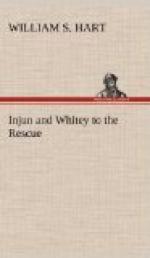All the men were hushed, as though in expectancy. Whitey peered into the darkness, as they were doing. The cloud’s ragged edge showed at the lower half of the moon, and the ranch house could be dimly seen. From halfway between it and the men a small light appeared, flickered for a moment, then rising in the air described a graceful half-circle and alighted on the ranch house roof. Another, another, and then others followed. Injun was firing lighted arrows.
The moon came forth, and a volley of shots was poured from the ranch house toward the spot from whence the arrows had come. A volley from the cattlemen penetrated the walls of the house. Whitey trembled for Injun, out there in No Man’s Land. He need not have trembled, for that young person was safely crouching behind a boulder.
For the first time Whitey noticed that a breeze was stirring. Just as in the night when you light a match a breeze springs up to put it out, so now wind seemed to come to fan those burning arrows on the ranch house roof. Whitey watched, chilled but fascinated. The men around him were in the whirl of a fight. He was a spectator; one who saw other men being forced out of a trap to their deaths. The arrows burned like tinder. Whitey did not know that they were soaked in oil, brought along for the purpose of firing the house.
There had been no rain for a week, so the roof was dry, and soon narrow, snake-like lines of flame began to creep across it. Whitey thought of the feelings of the imprisoned sheepmen, knowing what was going on overhead, but helpless to prevent it. It seemed that they surely must make some effort. Both sides had ceased firing. Then an idea occurred to Whitey. Why did not the sheepmen escape from the back of the house? A volley of shots from the other side of the valley seemed to answer the question. Under cover of the darkness Mart Cooley had sent half his men to a point that commanded the rear of the ranch house. Their shots sounded continuously for a moment and told a plain story. The sheepmen had tried to escape from the back, and had failed.
These shots told another story. Why were they not answered from the hills? Because the hill men had joined their fellows in the ranch house. All were cooped up there, making their choice of deaths; by fire or by bullets. Anything would be better than the fire. Why didn’t they do something? Whitey found himself growing impatient with these doomed men whom he never had seen.
Something was stirring on the ranch house roof and glittered occasionally in the moonlight. The cattlemen watched it intently. It was the head of an axe, forcing its way through from beneath. The cattlemen laughed. When the wielded axe had formed a sufficient opening, the head and shoulders of a man appeared in it, and his hands followed, supporting a bucket of water. Twenty of the attackers’ rifles were directed toward the roof, but at an order from Mart Cooley they were lowered. Mart raised his rifle, fired a single shot, and the man’s figure disappeared through the opening, the bucket falling from his hands and pitching down over the edge of the roof.




